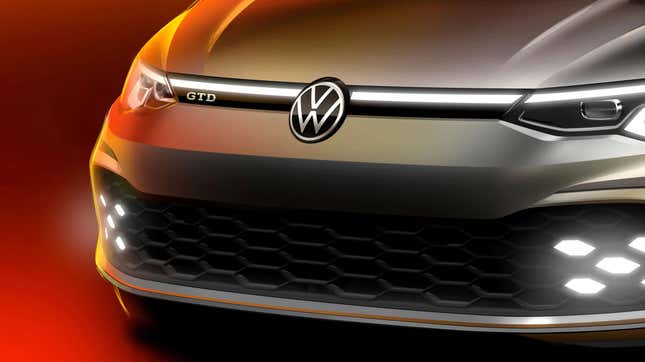
The residual effects of Dieselgate may still be impacting Volkswagen years later, but that doesn’t mean the company has given up on the fuel quite yet. In fact, VW announced that the company will bring the 2021 Golf GTD to next month’s Geneva Motor Show in an attempt to prove that diesel is still a fuel of the future.
It’s being marketed as “one of the cleanest combustion engines in the world,” as per VW’s press release:
Once again, Volkswagen will introduce one of the most economical and at the same time sporty compact models to the market with its Golf GTD. A significant increase in performance is accompanied by lowest emissions: The Performance TDI (turbo diesel injection)’s efficiency has been significantly optimised and CO2 emissions have been cut even further, all while simultaneously improving responsiveness.
Thanks to a new twin dosing SCR with double AdBlue® injection, NOx emissions will be greatly reduced as compared to its predecessor. This makes the TDI in the new Golf GTD one of the cleanest combustion engines in the world. And by the way, the four-cylinder powerhouse is started by pressing a pulsing button in the completely digitalised cockpit – to the beat of a new era.
Basically, VW is making the bold claim that its newest diesel engine will be good for the environment and for the driver of the car itself. How much of this is something VW earnestly believes versus how much marketing it’s obligated to engage in for the sake of the customers still buying diesels? Who can say! Car companies are engineering powerhouses, but they’re marketing operations first and foremost.
A few weeks ago, Volkswagen posted a video explaining the benefits of its twin-dosing diesel technology. You can watch that below if you’re looking to learn more:
Basically, a second catalytic converter in the exhaust system enables an expanded period of time in which the exhaust gases can continue to be treated and prevent excess ammonia slip. It’s all about reducing carbon dioxide emissions.
VW isn’t ready to talk about the details on this particular car—at least not until Geneva—but now that we know it’s coming, we can start ramping up all the speculation. Considering how popular VW’s diesels were both before and after Dieselgate, Volkswagen probably won’t have to worry too much about sales, so long as it keeps its’ nose—and tailpipes—clean.